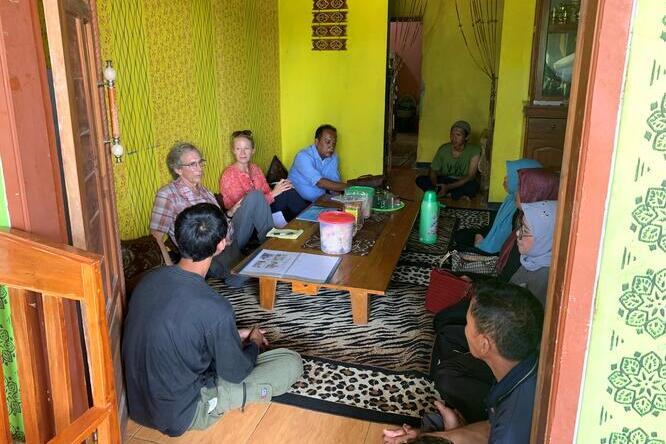ADMI receives funding for two new projects to empower smallholders and women farmers in Indonesia

Empowering smallholders and women farmers in Indonesia is the focus of two new projects funded by ADM Cares, the social investment program of ADM. The projects will be managed by a team from the ADM Institute for the Prevention of Postharvest Loss (ADMI), which is based in the College of Agricultural, Consumer and Environmental Sciences (ACES) at the University of Illinois.
The new projects build on the previous work of ADMI and will be managed by Paul McNamara, professor in the Department of Agricultural and Consumer Economics, and Anna Snider, associate director of ADMI.
ADMI’s experience in similar settings has shown that when women farmers are empowered, their families, especially their children, benefit through increased expenditures on health, education, and clothing, along with greater dietary diversity.
“These research-engagement projects in Indonesia expand on our previous work towards building a more food secure world for smallholder farmers and the people they feed. We, along with our partners, appreciate the ongoing support from ADM and ADM Cares,” said Alex Winter-Nelson, director of the ADMI and interim associate dean for research in the College of ACES.
Empowering smallholders in Indonesia through strengthening female-led farmer organizations
The ADMI team will work with the Indonesian Agency for Agricultural Extension and Human Resource Development (IAAEHRD) and Bogor University of Agriculture (IPB) in Java to pilot a program of extension to support the needs of farmer groups, serving mainly women farmers. Farmer groups will receive training in identifying and implementing small-scale income-generating agricultural activities, climate smart agricultural practices that promote soil health and increase yields, human nutrition, and organizational practices to harness the power of groups for marketing, finance, and access to technologies. Strengthening the ability of these groups to engage in agricultural value chains can raise members’ incomes while reducing postharvest losses.
This effort will reach 50 extension workers and approximately 500 smallholder farmers, the majority of which will be women, to increase their capacity for higher incomes and more sustainable agricultural activities.
Women’s participation on Indonesian oil palm plantations: How can plantations and policy support gender equity?
The ADMI team will collaborate with partners at IPB University Bogor to investigate gender issues on oil palm plantations. This research will use a case study approach to investigate, for example: How widespread is sexual harassment, gender-based violence, and discrimination on plantations and how does this intersect with ethnicity? What examples are there of strategies to address inequality? What are possible entry points for women’s involvement in decision-making processes? What resources are available/needed for corporations to help address inequality?
The research methods will include collecting a total of 600 household surveys and case studies from both cooperative and corporate plantations. A feedback session to stakeholders and policy makers will present the research findings and offer recommendations for empowering women. This work will bring increased attention to issues of gender equity in Indonesia’s oil palm industry and help identify additional training and resource needs.
Together, these two new projects in Indonesia represent ADMI’s efforts to help build more equitable, efficient, and inclusive agricultural value chains to reduce food loss and improve food security.